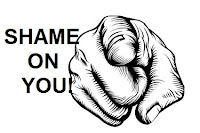To tip
or not to tip, that is the question...
At
least for Mr Pink, the main character of this clip from Quentin Tarantino´s first
movie: Reservoir Dogs.
Watch
this little video (with English subtitles) and take a
look at the vocabulary below to understand all the money-related vocabulary,
all the expressions, jokes and rude language used by these gangsters.
#Note: You might notice how they use the verb don´t with the third person (He don´t/ She don´t) instead of using the correct form (He doesn´t/ She doesn´t). Although it´s grammatically incorrect it´s very common in spoken English, especially in the United States.
Vocabulary
Check: a list showing what you have eaten and how much do you have to pay. It is also called bill in British English.
Tip: extra money given to the waiter in a restaurant to show that you have liked the service.
Buck: a dollar.
To change someone´s mind: to have an idea that you didn´t have before.
To shoot: to fire a bullet.
To cough up: to give money, especially when you do not really want to.
Green: dollar notes (because of their green color).
To tip: to give a tip.
Chick: a young woman.
To make: in this sense, to earn money.
To make shit: to earn a little amount of money.
To quit: to leave your
job.
To have the balls: to have courage.
Let me get this straight: expression used when you want to understand or clarify something.
To deserve: to have earned something because of the way you have behaved.
To suck: to move the tongue and muscles of the mouth around something inside your mouth.
Dick: penis
To order: to ask for something to be made, supplied or delivered, especially in a restaurant or shop.
To fill: to put a substance into an empty space.
To be busy: to work hard or to have many things to do.
To starve: to become very weak or even die because there is not enough food to eat.
Minimum wage: the smallest amount of money that employers are legally allowed to pay to their employees.
To deem: to consider or judge in a particular way.
Worthy: deserving respect, admiration or support.
To bust your ass: to work hard.
Bullshit: complete nonsense or something that is not true.
Occupation: job.
College: university.
Non-college graduate: a person who has not gone to college.
To make a living: to earn enough money to buy the things you need to live.
To tax: to make somebody pay a tax (an amount of money paid to the Government).
To be fucked up: to be stupid and not reasonable.
On a regular basis: occurring in regular time intervals.
To sign: to write your name.
To play ball: to cooperate with others.
To type: to write using a machine such as a typewriter or a computer.
The rent: the money you pay monthly to the owner of the house you are living in.
Rambler: a person who enjoys walking on the countryside.
To ramble: to walk for pleasure, especially in the countryside.
Cheap bastard: a man usually of good socioeconomic status that never pays.
Goddamn/goddamned: rude expression
used to emphasize what you are saying.
So, what do you think? Should you tip the waitress next time you go to a restaurant?
Leave your answer
in the comments
























